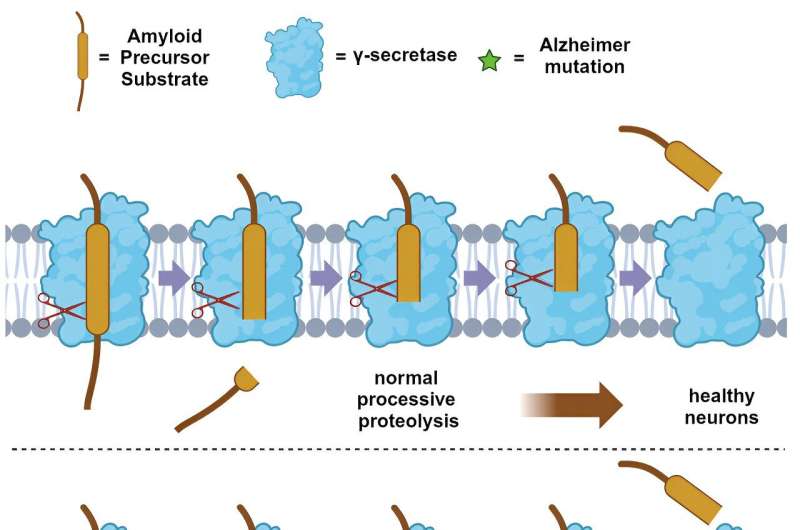This article has been reviewed according to Science X's editorial process and policies. Editors have highlighted the following attributes while ensuring the content's credibility:
fact-checked
peer-reviewed publication
trusted source
proofread
Study: Mutations in hereditary Alzheimer's disease damage neurons without 'usual suspect' amyloid plaques

A University of Kansas study of rare gene mutations that cause hereditary Alzheimer's disease shows these mutations disrupt the production of a small sticky protein called amyloid.
Plaques composed of amyloid are notoriously found in the brain in Alzheimer's disease and have long been considered responsible for the inexorable loss of neurons and cognitive decline. Using a model species of worm called C. elegans that are often used in labs to study diseases at the molecular level, the research team came to the surprising conclusion that the stalled process of amyloid production—not the amyloid itself—can trigger the loss of critical connections between nerve cells.
The research, appearing in the journal Cell Reports, was headed by Michael Wolfe, Mathias P. Mertes Professor of Medicinal Chemistry at KU.
The research team focused on the rare inherited mutations because these mutations are found in genes that encode proteins that produce amyloid.
"If we can understand what's happening in this inherited form of the disease where a single mutation can trigger it," Wolfe said, "that might be a clue to what's going on in all the other cases."
The rare mutations are particularly devastating, as they fate the mutation carrier to Alzheimer's disease in middle age, and children of a mutation carrier have a 50% chance of inheriting the disease-causing mutation.
Wolfe said hereditary Alzheimer's disease shows the same pathology, the same presentation clinically, and the same progression of symptoms as the "common, garden-variety" of Alzheimer's related to old age.
"You see the same amyloid plaques in the hereditary disease," he said. "We think that these inherited mutations, though rare, are key to what's going on with all Alzheimer's disease."
Wolfe, who earned his doctorate at KU and returned to the university seven years ago for collaborative research opportunities, joined forces with Brian Ackley, associate professor of molecular biology at KU, whose lab specializes in research with the C. elegans model worm. The research team also included other KU collaborators as well as investigators in Beijing, China, and at Harvard Medical School.
Wolfe said the discovery could point the way toward new approaches to Alzheimer's therapies, and he hoped fellow researchers and developers of drug therapies would pay close attention to his team's results.
"Our findings suggest what's needed is a stimulator of the amyloid-producing enzyme to restart stalled processes and address both problems: eliminating stalled protein complexes that lead to degeneration of nerve cell connections and producing more soluble forms of amyloid. This approach could address both contributing factors simultaneously."
More information: Sujan Devkota et al, Familial Alzheimer mutations stabilize synaptotoxic γ-secretase-substrate complexes, Cell Reports (2024). DOI: 10.1016/j.celrep.2024.113761


















